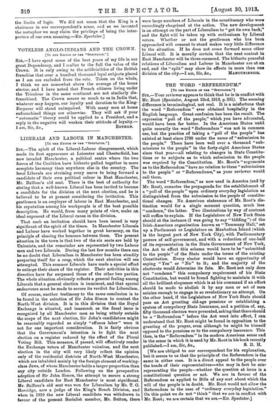THE WORD "REFERENDUM." [To THE EDITOR OP THE " SPECTATOR."]
SIR,—Your reviewer appears to think that he is in conflict with Mr. Root (Spectator, August 23rd, 1913, p. 281). The seeming difference is terminological, not real. It is a misfortune that the word " Referendum " ever obtained hospitality in the English language. Great confusion has been the result. The expression "poll of the people," which you have advocated, would have been far better. In the American States until quite recently the word "Referendum" was not in common use, but the practice of taking a "poll of the people" has existed at least since 1780 under the name of " submission to the people." There have been well over a thousand " sub-
missions to the people" in the forty-eight American States since that year—all relating to changes in State Constitu- tions or to subjects as to which submission to the people was required by the Constitution. Mr. Root's "arguments as to the Referendum " have no relation to these " submissions to the people " or " Referendums," as your reviewer would call them.
The word "Referendum," as now used in America (and by
Mr. Root), connotes the propaganda for the establishment of a " poll of the people " upon ordinary everyday legislation as distinguished from the submission to the people of constitu- tional changes. No American statesman of Mr. Root's die. tinction would for a single moment question, much less "condemn," the latter. Two illustrations by way of contrast will suffice to explain. If the Legislature of New York State should at the instance (I was going to say " bidding ") of the Irish-American organization known as " Tammany Hall," set up a Parliament or Legislature on Manhattan Island (which is the largest part of New York City), with Parliamentary powers of self-government, and with a reduction of oue-half of its representation in the State Government of New York, the Act to effect this scheme would have to be " submitted to the people " of the State -under the terms of the existing Constitution. Every elector would have an opportunity of saying "Yes" or "No" to it; and the majority of the electorate would determine its fate. Mr. Root not only does not "condemn" this compulsory requirement of his State Constitution, but would be found fighting to maintain it with all the brilliant eloquence which is at his command if an effort should be made to abolish it by any man or set of men asinine enough to engage in so revolutionary an attempt. On the other hand, if the Legislature of New York State should pass an Act granting old-age pensions or establishing a system of compulsory State Insurance, and a petition of, say, fifty thousand electors were presented, asking that there should be a " Referendum " before the Act went into effect, I can understand that Mr. Root might be found in opposition to the granting of the prayer, even although he might be himself opposed to the pensions or to the compulsory insurance. This then, is the "Referendum" in its modern American sense and in the sense in which it is used by Mr. Root in his book recently
[We are obliged to our correspondent for his explanation,
but it seems to us that the principle of the Referendum is the same in either case. It is a direct appeal to the people over the heads of their representatives—who may in fact be mis- representing the people—whether the question at issue is a constitutional question or not. We are in favour of the Referendum as applied to Bills of any sort about which the will of the people is in doubt. Mr. Root would not allow the Referendum in the case of "ordinary everyday legislation." On this point we do not " think " that we are in conflict with Mr. Root; we are certain that we are.—ED. Spectator.]


































 Previous page
Previous page